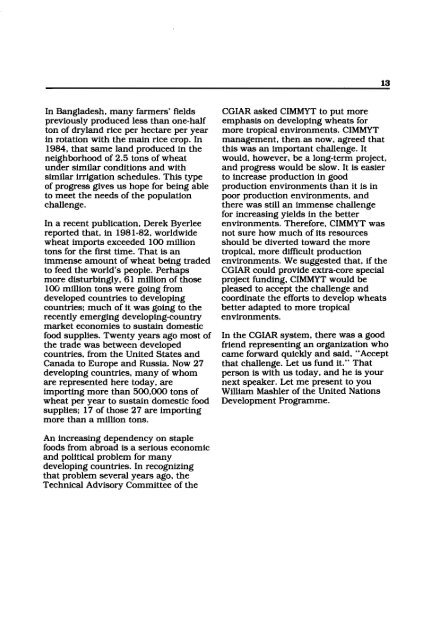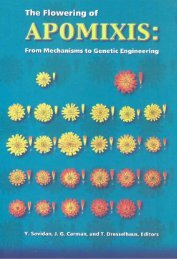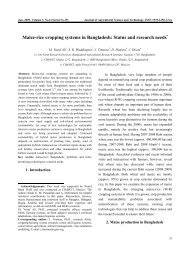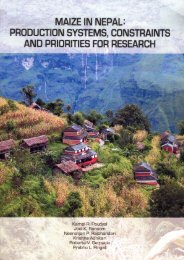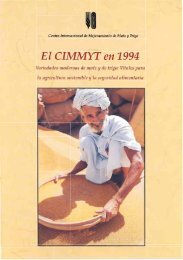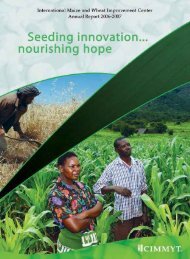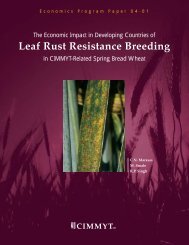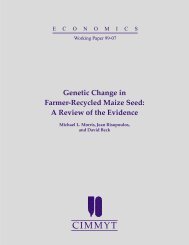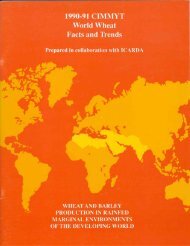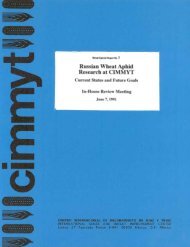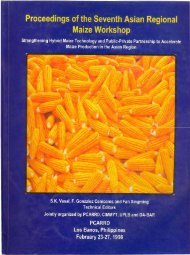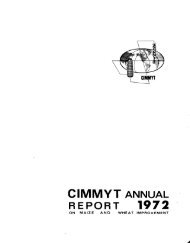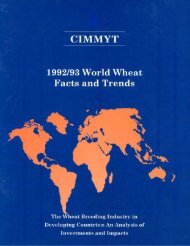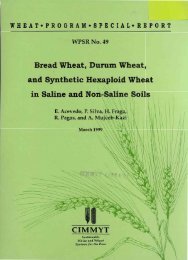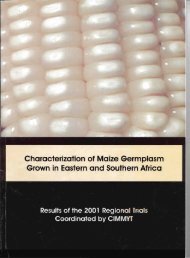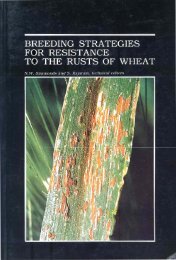the Symposium on Wheats for More Tropical Environments - cimmyt
the Symposium on Wheats for More Tropical Environments - cimmyt
the Symposium on Wheats for More Tropical Environments - cimmyt
- No tags were found...
You also want an ePaper? Increase the reach of your titles
YUMPU automatically turns print PDFs into web optimized ePapers that Google loves.
13In Bangladesh. many farmers' fieldspreviously produced less than <strong>on</strong>e-halft<strong>on</strong> of dryland rice per hectare per yearin rotati<strong>on</strong> with <str<strong>on</strong>g>the</str<strong>on</strong>g> main rice crop. In1984. that same land produced in <str<strong>on</strong>g>the</str<strong>on</strong>g>neighborhood of 2.5 t<strong>on</strong>s of wheatunder similar c<strong>on</strong>diti<strong>on</strong>s and withsimilar irrigati<strong>on</strong> schedules. This typeof progress gives us hope <strong>for</strong> being ableto meet <str<strong>on</strong>g>the</str<strong>on</strong>g> needs of <str<strong>on</strong>g>the</str<strong>on</strong>g> populati<strong>on</strong>challenge.In a recent publicati<strong>on</strong>. Derek Byerleereported that. in 1981-82. worldwidewheat imports exceeded 100 milli<strong>on</strong>t<strong>on</strong>s <strong>for</strong> <str<strong>on</strong>g>the</str<strong>on</strong>g> first time. That is animmense amount of wheat being tradedto feed <str<strong>on</strong>g>the</str<strong>on</strong>g> world's people. Perhapsmore disturbingly. 61 milli<strong>on</strong> of those100 milli<strong>on</strong> t<strong>on</strong>s were going fromdeveloped countries to developingcountries: much of it was going to <str<strong>on</strong>g>the</str<strong>on</strong>g>recently emerging developing-countrymarket ec<strong>on</strong>omies to sustain domesticfood supplies. Twenty years ago most of<str<strong>on</strong>g>the</str<strong>on</strong>g> trade was between developedcountries. from <str<strong>on</strong>g>the</str<strong>on</strong>g> United States andCanada to Europe and Russia. Now 27developing countries. many of whomare represented here today. areimporting more than 500.000 t<strong>on</strong>s ofwheat per year to sustain domestic foodsupplies: 17 of those 27 are importingmore than a milli<strong>on</strong> t<strong>on</strong>s.CGIAR asked CIMMYT to put moreemphasis <strong>on</strong> developing wheats <strong>for</strong>more tropical envir<strong>on</strong>ments. CIMMYTmanagement. <str<strong>on</strong>g>the</str<strong>on</strong>g>n,as now. agreed thatthis was an important challenge. Itwould. however, be a l<strong>on</strong>g-term project.and progress would be slow. It is easierto increase producti<strong>on</strong> in goodproducti<strong>on</strong> envir<strong>on</strong>ments than it is inpoor producti<strong>on</strong> envir<strong>on</strong>ments. and<str<strong>on</strong>g>the</str<strong>on</strong>g>re was still an immense challenge<strong>for</strong> increasing yields in <str<strong>on</strong>g>the</str<strong>on</strong>g> betterenvir<strong>on</strong>ments. There<strong>for</strong>e. CIMMYT wasnot sure how much of its resourcesshould be diverted toward <str<strong>on</strong>g>the</str<strong>on</strong>g> moretropical. more difficult producti<strong>on</strong>envir<strong>on</strong>ments. We suggested that. if <str<strong>on</strong>g>the</str<strong>on</strong>g>CGIAR could prOVide extra-core specialproject funding. CIMMYT would bepleased to accept <str<strong>on</strong>g>the</str<strong>on</strong>g> challenge andcoordinate <str<strong>on</strong>g>the</str<strong>on</strong>g> ef<strong>for</strong>ts to develop wheatsbetter adapted to more tropicalenvir<strong>on</strong>ments.In <str<strong>on</strong>g>the</str<strong>on</strong>g> CGIAR system. <str<strong>on</strong>g>the</str<strong>on</strong>g>re was a goodfriend representing an organizati<strong>on</strong> whocame <strong>for</strong>ward qUickly and said. ItAcceptthat challenge. Let us fund it. tt Thatpers<strong>on</strong> is with us today. and he is yournext speaker. Let me present to youWilliam Mashler of <str<strong>on</strong>g>the</str<strong>on</strong>g> United Nati<strong>on</strong>sDevelopment Programme.An increasing dependency <strong>on</strong> staplefoods from abroad is a serious ec<strong>on</strong>omicand political problem <strong>for</strong> manydeveloping countries. In recognizingthat problem several years ago. <str<strong>on</strong>g>the</str<strong>on</strong>g>Technical Advisory Committee of <str<strong>on</strong>g>the</str<strong>on</strong>g>


